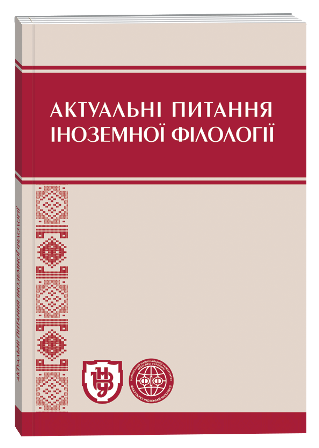NARRATIVE STRATEGIES FOR EXPRESSING THE PROBLEMS OF BERNHARD SCHLINK'S POST-TOTALITARIAN NOVEL «THE READER»
DOI:
https://doi.org/10.32782/2410-0927-2025-22-10Keywords:
narrative strategy, culture of memory, individual and collective memory, moralityAbstract
The article examines Bernhard Schlink's novel The Reader in the context of the latest trends in contemporary literary studies, in particular, the issues of memory, trauma and moral responsibility. The aim of the article is to analyse the narrative strategies used by the author to reflect the main themes of the novel, namely the culture of memory, problematisation of historical guilt, moral responsibility and personal choice in difficult life conditions. Particular attention is paid to the interaction of individual and collective memory, historical responsibility and moral comprehension of the past. The article addresses issues that reflect such problems of the society of that time as the justification of a crime through obedience to orders, relationships between people with a large age difference, and illiteracy as a metaphor for ignorance and shame. The work reveals psychological portraits of the main characters, Michael Berg and Hanna Schmitz, which help the author to examine the issue of intergenerational dialogue in German society after the Second World War, exploring how the story of a couple in love reflects the attempt of the wartime generation to comprehend the Nazi past. Particular attention is paid to the issues of guilt, morality, shame, and redemption that run through the novel. The paper demonstrates how individual moral dilemmas reflect a broader collective experience, as well as how the novel's narrative strategies contribute to a deeper rethinking of historical events. The article identifies the following narrative strategies: “I-narrator” (the novel is written in the first person, on behalf of the protagonist), “retrospective narration” (the protagonist tells about events that happened in the past), “chronological division” (three parts of the novel corresponding to three stages of the protagonist's life), “intertextuality” (the novel contains references to literary works) and “linguistic restraint” (the language of the novel is restrained, without emotionality).
References
Марценішко В. Історія і травматична пам’ять у романі Бернгарда Шлінка «Читець». Літературознавство. Фольклористика. Культурологія. 2018. Вип. 27-28. С. 167-186. URL: http://nbuv.gov.ua/UJRN/Lfk_2018_27-28_16
Таратута С. Втілення ідеї розлюднення в образній системі роману Б.Шлінка «Читець». Journal of Cross-Cultural Education. 2023. № 2. P. 63–74.
Третевич М. Зміна меморіальної парадигми у суспільно-історичному та літературному дискусі Німеччини 90-х-2000-х років. Науковий вісник Миколаївського національного університету імені В. О. Сухомлинського. Серія: Філологічні науки. 2016. № 2. С. 239–244.
Gries B. Die Grass-Debatte. Die Vergangenheit in in der Wahrnehmung von drei Generationen. Marburg, 2008. S. 23.
MacKinnon, John E. «Law and Tenderness in Bernhard Schlink's «The Reader» Law and Literature. Vol. 16, No. 2, 2004. P. 179–201.
Metz J. «Truth Is a Woman»: Post-Holocaust Narrative, Postmodernism, and the Gender of Fascism in Bernhard Schlink's «Der Vorleser». The German Quarterly. Vol. 77, No. 3, 2004. P. 300–323.
Moenning U. Die Erzählung von Alexander und Semiramis : kritische Ausgabe mit einer Einleitung, Übersetzung und einem Wörterverzeichnis. Berlin, 2004.
Niven B. Bernhard Schlink's «Der Vorleser» and the Problem of Shame. The Modern Language Review. Vol. 98, No. 2, 2003. P. 381-396.
Schlink B. Der Vorleser. Bern. 1995, 207 S.
Welzer H. Kumulative Heroisierung. Nationalsozialismus und Krieg im Gespräch zwischen den Generationen. Mittelweg 36. 2001. S. 57–73.








